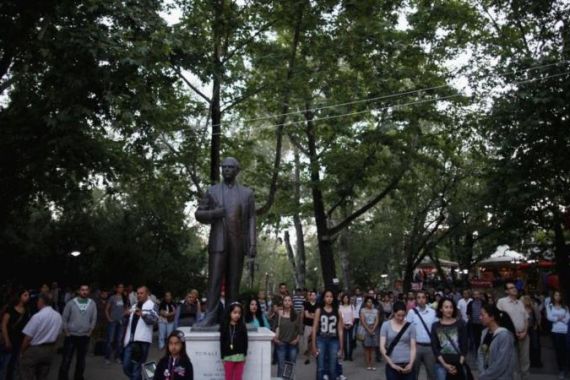Turkey’s new democratic move
Sweeping reforms announced by Prime Minister Erdogan are hoped to be an impetus for drafting a new constitution.

The new democratic measures introduced by Prime Minister Recep Tayyip Erdogan on September 30 in Ankara, usher in a new era in Turkey’s efforts to develop a fully functioning democracy.
The 28-point package addresses a number of long-standing issues ranging from lowering the election threshold to allowing education in Kurdish and other languages in private schools. It also lifts the ban on headscarf for women in public offices – a move that was long overdue.
The government has more work to do and has already promised to do so. But democratisation is also a test for Turkey’s opposition parties as they react to the new package with unreasonable maximalist demands and ideological rejectionism.
The Gezi Park protests in June of this year have cast a shadow over Turkey’s democratic gains over the last decade, leading some to believe that Turkey was turning away from its reformist, progressive agenda. Against the charges of authoritarianism, Erdogan is pushing back with the largest democratisation package in recent memory. The new measures expand civil liberties, increase political participation and respond to the legitimate grievances of social groups.
Conforming to EU standards
They also bring Turkey closer to the Copenhagen criteria and the EU acquis. As a matter of fact, the Turkish Parliament has already passed over two thousand pieces of legislation in line with the EU acquis. More will follow.
|
The new measures are important but not a panacea for all of Turkey’s problems. Yet, they point to the way forward for greater democratisation. |
The proposed changes give an idea about the extent of the new reforms: lowering the election threshold from the current 10 percent to 5 percent with district system or abolishing it with single member district system; allowing education in languages other than Turkish in private schools; lifting the headscarf ban for women in holding public offices; allowing political campaigning and propaganda in different languages and dialects; introducing heavier penalties for hate crimes and discrimination; protecting different life styles and belief systems; and expanding the right to assembly and demonstration by enabling civil society groups to have a say over its mechanism.
The proposed reforms also include returning the old names of villages and towns changed after the 1980 military coup; abolishing the student oath in primary schools; returning the land property of the Mor Gabriel Monastery to Turkey’s Syriac Christian community; and establishing an institute for the study of Roma culture in Turkey.
In breaking another taboo, the name of Haci Bektas-i Veli, a spiritual master respected by Turkish Muslims and a pivotal figure of the Alevi-Bektasi tradition, will be given to a public university in Nevsehir where Haci Bektas-i Veli is buried. This step will be followed by other measures to respond to the demands of Turkey’s Alevi community.
In terms of political participation, the package allows all voters regardless of their official jobs and positions to enrol in political parties. In addition, small political parties will no longer be required to have local chapters in towns and districts in order to be eligible for government aid. All of these measures will increase political participation and ensure fairness in political representation.
Kurdish issue
These issues have been raised by various political and civilian groups over the years. Hence the new measures are addressed to a large swath of the public and aim to raise the standards of democratic rights and individual freedoms for all. They will also have important implications for writing a new constitution and resolving the Kurdish issue through peaceful means.
The Kurdish issue has been Turkey’s most painful and costly problem since the 1980s. In the fight against PKK terrorism, over 40 thousand people have lost their lives and billions of dollars have been spent on fighting terrorism. Now there is a chance to resolve this issue through peaceful means, and the new reform steps will certainly facilitate this process. But this depends on the PKK’s willingness to disarm so that further democratic reforms can be introduced without compromising the country’s security.
The new constitution, which will replace the 1982 Constitution written by military generals after the 1980 coup, has been on the agenda of the Turkish Parliament for almost two years now. The new democratisation package, if supported by the opposition parties, can provide a much-needed impetus for the new constitution.
The new democratisation package is a test for Turkey’s opposition parties. The way they react to it will show the extent to which they are ready for greater and deeper democratisation in Turkey. Neither maximalist demands nor rejectionist attitudes will help Turkey’s march towards advanced democracy.
The new measures point to the way forward for greater democratization. Of course, more is needed and more will follow.
Dr Ibrahim Kalin is the Deputy Undersecretary of State and Senior Adviser to the Prime Minister of Turkey.
